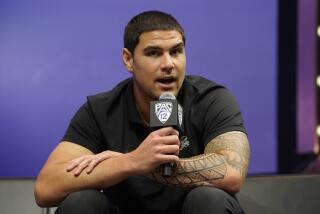Passing Out Character References
- Share via
On May 25, the coaching division of the U.S. Olympic Committee and the Character Counts! Coalition held a news conference announcing an agreement signed by many of the most influential people in amateur sports to promote greater emphasis on the ethical and character-building aspect of sports. They issued the Arizona Accord, a statement of principles and a long list of specific implementation strategies.
Former UCLA coach John Wooden, Dr. Robert Maxson, president of Long Beach State, and John Naber, president of the U.S. Olympic alumni association, along with representatives of the USOC and Character Counts! spoke fully and powerfully on behalf of 44 influential men and women who drafted and signed the Accord, including the presidents of major universities, athletic directors from Stanford, Notre Dame, Kentucky, Iowa, Arizona, Arizona State, Florida and Florida State, the heads of many of the most influential sports associations and media luminaries such as Bob Costas.
Yet the only mention of the Accord in The Times was a brief description by Randy Harvey. He said nothing about the specific contents of the Accord or of the major commitments already made by institutions and organizations. Instead, he stressed that the news conference was poorly attended by the media, concluding that our message is not likely to be heard over chants for recovering coach-choker Latrell Sprewell.
This is censorship by cynicism. I can understand how hardened journalists become reflexive pessimists, but let readers decide whether it will have impact. At least tell them they can get information at www.charactercounts.org.
MICHAEL JOSEPHSON, President, Character Counts! Coalition
****
Editor’s note: So that Michael Josephson may be allowed to climb down off his high horse, here are some of the key elements of the May 14 Arizona Accord:
* The essential elements of character building and ethics in sports are embodied in the concept of sportsmanship and six core principles: trustworthiness, respect, responsibility, fairness, caring and good citizenship. The highest potential of sports is achieved when competition reflects these “six pillars of character.”
* Participation in athletic programs is a privilege, not a right. To earn that privilege, athletes must conduct themselves, on and off the field, as positive role models who exemplify good character.
* In recruiting, educational institutions must specifically determine that the athlete is seriously committed to getting an education and has or will develop the academic skills and character to succeed.
* The highest administrative officer of organizations that offer sports programs must maintain ultimate responsibility for the quality and integrity of those programs. Such officers must assure that education and character development responsibilities are not compromised to achieve sports performance goals and that the academic, emotional, physical and moral well-being of athletes is always placed above desires and pressures to win.
* The faculties of educational institutions must be directly involved in and committed to the academic success of student-athletes and the character-building goals of the institution.
* Everyone involved in athletic competition has a duty to treat the traditions of the sport and other participants with respect. Coaches have a special responsibility to model respectful behavior and the duty to demand that their athletes refrain from disrespectful conduct, including verbal abuse of opponents and officials, profane or belligerent trash-talking, taunting and unseemly celebrations.
* Though economic relationships between sports programs and corporate entities are often mutually beneficial, institutions and organizations that offer athletic programs must safeguard the integrity of their programs. Commercial relationships should be continually monitored to ensure against inappropriate exploitation of the organization’s name or reputation and undue interference or influence of commercial interests. In addition, sports programs must be prudent, avoiding undue financial dependencies on particular companies or sponsors.
* The profession of coaching is a profession of teaching. In addition to teaching the mental and physical dimensions of their sport, coaches through words and example must also strive to build the character of their athletes by teaching them to be trustworthy, respectful, responsible, fair, caring and good citizens.
More to Read
Go beyond the scoreboard
Get the latest on L.A.'s teams in the daily Sports Report newsletter.
You may occasionally receive promotional content from the Los Angeles Times.






